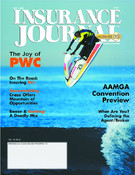Many states apply the same drunk driving standards to boat operators as they do to motor vehicle operators. Iowa is the latest state to enact this type of legislation with a new intoxication standard that sets a maximum .10 percent maximum blood alcohol content for boat operators. This standard is the same as that set in other states, including Arizona and Nevada. Some states, including California, Oregon and Washington, have an even stricter standard (.08 percent).
In 1997, alcohol consumed by recreational boat occupants contributed to 8.6 percent of all boating accidents, according to the Insurance Information Institute (I.I.I.). Furthermore, a number of factors on the water, including dehydration, motion, wind, noise and vibration, contribute to a greater level of impairment from the consumption of alcohol.
“Even if you’re not drinking, you’re impaired because of all the environmental stimuli and stresses that are out there,” noted Randy Edwards, assistant chief of the law enforcement bureau at the Iowa Department of Natural Resources and that state’s designated boating law administrator. “If you put alcohol on top of that, you increase the chances something bad is going to happen.”
According to the National Safe Boating Council, research conducted in four states showed that 51 percent of people killed in boating accidents had a blood alcohol content of .04 or higher and 30 percent had a blood alcohol content of .10 or more.
However, even with strict drinking and boating laws in place, many violations may go unnoticed or unreported. “There are a lot of people that think that boating is recreation, not at all like driving your car,” Edwards said. “On the water there are no intersections or signs. Everybody’s coming and going. It’s much more dangerous out there on the water. The bill will not keep people from drinking in their boats. That’s not the intent of it. It’s just that the operator cannot be operating while under the influence.”
From an insurance underwriting perspective, there are different approaches taken with respect to the issue of an individual’s motor vehicle or boating operation record. “One of the things that is very strange in the boat and yacht insurance business is it grew up in various companies in different ways,” said Robert Chapman, executive vice president of INAMAR in Philadelphia. “What sort of underwriting tools to use sort of depends on your heritage. Some companies use [motor vehicle records], some companies use credit reports. Some people, typically the ones that are very closely associated with the independent agency system, tend to rely on the independent agent’s relationship and knowledge of his insured.”
Chapman also noted that two issues have become somewhat problematic. “One is the competition has driven rates to ridiculous levels,” he said. “Combine that with states beginning to charge for [motor vehicle record] underwriting information, and
that begins to put a squeeze on the companies.”
David Strauss, president of Sullivan & Strauss in Long Island, agreed some companies apply “a broad brush approach” to the issue of an individual’s driving record. “There are some that don’t look at it and simply charge an average rate across the entire boating population,” he said. “Others do check on and ask about the driving records of the operators in the household. We do. Driving while under the influence in either a motor vehicle or a boat does have an impact. It raises the rates significantly and may restrict some of the coverages as well. Depending on the rest of the circumstances, [it may] even impact overall eligibility.”
Another underwriting consideration can be the ability of an individual state to enforce its laws with regard to drinking and boating. “If along with [drinking and boating laws] there are also enforcement measures, that will certainly influence our view towards writing in that state,” Strauss said. “It may have an impact on the overall rate for the individual state.” Strauss said there is generally a nationwide shortage of patrol force for waterways.
Strauss also said motor vehicle driving records are readily available in California, but not in all states. In those states where it is a little more difficult to get those records, he said it constitutes a technical, but not a legal difficulty. “The history is a matter of public record,” he said. “Some states have an automated method of being able to get that history, and that makes it easier.”
While it may take some more time before the national attitude towards intoxicated boat operators reaches the same level as that for intoxicated motor vehicle operators, there is no ambivalence on the part of many insurers. “I’m a boater,” Chapman said. “If you drink when you boat, I don’t want to do business with you.”
Topics Auto
Was this article valuable?
Here are more articles you may enjoy.


 Deep Freeze and Drought Fueled a Massive Florida Wildfire
Deep Freeze and Drought Fueled a Massive Florida Wildfire  Sompo Holdings Completes Acquisition of Aspen, Taking it Private
Sompo Holdings Completes Acquisition of Aspen, Taking it Private  Premium Slowdown, Inflation Factors to Lead to Higher P/C Combined Ratio: AM Best
Premium Slowdown, Inflation Factors to Lead to Higher P/C Combined Ratio: AM Best  ‘Meaningful Decline’ in Industry Q1 Underwriting Profit Expected From Winter Storms
‘Meaningful Decline’ in Industry Q1 Underwriting Profit Expected From Winter Storms 


